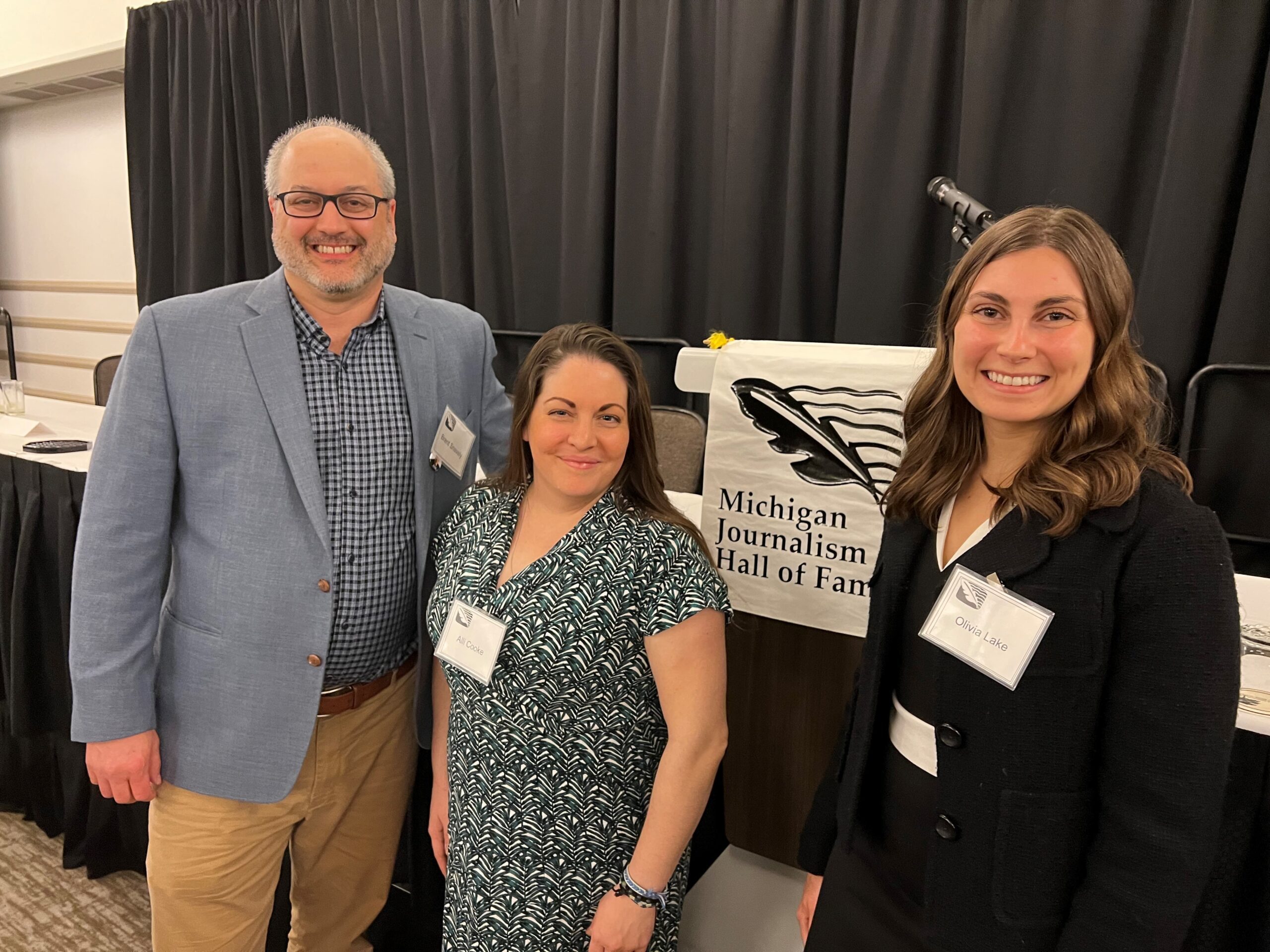By Alli Cooke, Manager
As a relatively new transplant to Michigan, I attended the Michigan Journalism Hall of Fame’s annual induction ceremony this weekend knowing I wouldn’t be able to connect with former coworkers or immediately recognize attendees by their name tags alone – truly an introvert’s nightmare.
But as I stood in line for appetizers while waiting for two of my colleagues to join me at Michigan State University’s Kellogg Conference Center, I was struck by a PowerPoint presentation running unobtrusively in the background with slides featuring biographies of previous Hall of Fame inductees. Event organizers clearly wanted to remind all of the attendees about the more than 150 Michigan journalists who inspired and paved the way for many of those working in journalism today.
The Michigan Journalism Hall of Fame honored its inaugural class of inductees in 1952, when the organization was known as the Michigan Newspaper Hall of Fame and co-run by the Michigan Press Association and the MSU School of Journalism. Over the years, the group has elevated the work of industry legends including James Edmund Scripps, founder of The Detroit News; Roberta Applegate, an Associated Press reporter and the first woman to cover the Michigan state capitol beat; Angelo B. Henderson, the first (and still only) African American journalist to win a Pulitzer Prize; and Mary Lou Butcher, a journalist at The Detroit News who won a class-action lawsuit against the paper for gender-based discrimination and became an advocate for working women everywhere.
The inductees for the class of 2022 include an impressive list of trailblazers who all served as mentors and role models throughout their careers. They are: Robert Ankeny, a federal courts reporter for The Detroit News and Crain’s Detroit Business; Greg Dorsett, a photo editor at the Muskegon Chronicle; Marguerite Gahagan, a courts reporter at The Detroit News who later founded a pioneering weekly paper focused on environmentalism and conservation; Tim Kiska, a professor and multimedia journalist who worked for the Detroit Free Press, The Detroit News, and WWJ-AM before developing the award-winning Detroit History Podcast; and Beth Konrad, who has served as a broadcast journalist, news executive, professor, and communications consultant.
While only two inductees – Kiska and Konrad – are alive today and were able to attend the induction ceremony, it was clear to me that each of the five had a profound impact on their colleagues over the course of their respective careers.
I got to hear firsthand stories about Ankeny from my colleague Brent Snavely, who worked with him at Crain’s for nine years. He introduced me to several of his Crain’s friends and coworkers who all said Ankeny was famous for telling – and often retelling, and then retelling – stories about his days covering the John DeLorean trial, meeting mob lawyers for lunch, and befriending federal court judges and how he earned their trust.

Greg Dorsett’s wife and son described the “hundreds” of interns Dorsett mentored, who have now spread out across the world as photographers and multimedia journalists in their own right. Anne and Stephen Gahagan similarly described the journalists who were inspired by their cousin Marguerite’s passion for justice in both the courts system and the environment. And both Tim Kiska and Beth Konrad shared their love for teaching and inspiring new generations of journalists at the University of Michigan-Dearborn and Wayne State University, respectively – and thanked many of the key people who helped them along the way.
Kiska said he wanted to start his speech by focusing on gratitude. “Take a minute tonight, on your way home, turn off the radio, and just think for a minute about the people who helped you get to where you are… because there is nobody in this room who got here on their own.”
The throughline is clear: mentorship is vital to the journalism industry, and it flows in both directions. Konrad noted in her speech that younger generations have much to teach veteran journalists about effective and innovative uses of new technologies – I imagine seasoned editors at The Washington Post initially raised their eyebrows at Dave Jorgenson’s unusual but highly effective TikTok strategy, anthropomorphized cans of Spam and all – just as early-career mentees would be well-served to absorb as much history and institutional knowledge as they can from those who have seen it all.
Konrad picked up on Kiska’s theme of gratitude and thanked her mentors, saying that her mother always told her to remember that journalism awards belong to “those who allowed you into their lives with their stories. Those who made themselves vulnerable – and trusted you.”
After hearing all of these fascinating stories, I left the Hall of Fame ceremony on Sunday evening with a long list of inductees to read about as I continue perfecting my own craft, helping our clients tell their stories, and learning more about my new home state.

